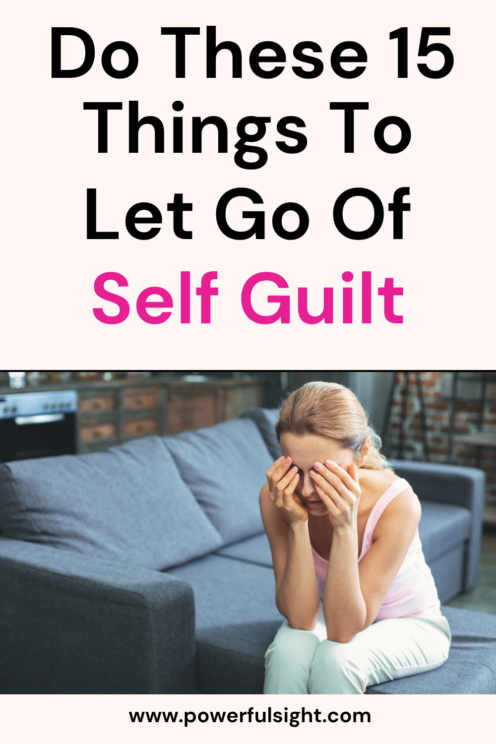Guilt is a powerful emotion that can weigh you down and prevent you from moving forward in life. Whether it’s guilt over a past mistake, a missed opportunity, or a decision that didn’t turn out as planned, holding onto guilt can be detrimental to your mental and emotional well-being. Here are tips on how to let go of guilt.
Why You Should Let Go of Guilt
Guilt is often accompanied by feelings of shame, self-blame, and regret. It can consume your thoughts, drain your energy, and prevent you from fully enjoying the present moment. Holding onto guilt keeps you stuck in the past, reliving the negative experiences over and over again. This can lead to a cycle of self-destructive behaviors and a decrease in self-esteem.
By letting go of guilt, you give yourself permission to heal and grow. You acknowledge that you are human and prone to making mistakes. It’s important to remember that guilt does not serve any productive purpose; it only holds you back from living a fulfilling life. When you release guilt, you create space for self-forgiveness, self-compassion, and personal growth. Letting go of guilt allows you to focus on the present moment and make positive choices that align with your values and aspirations.
How to let go of guilt
1. Identify and Acknowledge Your Guilt
The first step towards letting go of guilt is to identify and acknowledge it. Take some time to reflect on the areas of your life where guilt is present. Ask yourself what actions or decisions have led to this feeling. By confronting your guilt head-on, you can gain a clearer understanding of its source and begin the process of releasing it.
2. Practice Self-Compassion
One of the most powerful ways to let go of guilt is to practice self-compassion. Remember that you are human, and humans make mistakes. Instead of beating yourself up over past actions or perceived failures, offer yourself the same kindness and understanding you would extend to a loved one. Treat yourself with compassion and forgiveness, recognizing that you are deserving of love and acceptance.
Related: Journal prompts to forgive yourself
3. Challenge Your Guilt-Based Beliefs
Guilt is often rooted in deep-seated beliefs about ourselves and our worthiness. Take a closer look at the beliefs that underlie your guilt and question their validity. Are they based on facts or are they simply self-imposed judgments? By challenging these guilt-based beliefs, you can start to shift your perspective and let go of unnecessary guilt.
4. Learn from Your Mistakes
Guilt can be an opportunity for growth and self-improvement. Instead of dwelling on past mistakes, use them as learning experiences. Ask yourself what you can do differently in the future and how you can grow from the situation. By embracing a growth mindset, you can transform guilt into a catalyst for positive change.
Save the pin for later

5. Seek Forgiveness, Both from Yourself and Others
Sometimes, guilt stems from actions that have hurt others. In these cases, seeking forgiveness from those you have harmed can be a powerful step towards letting go of guilt. Additionally, forgiving yourself is equally important. Understand that we all make mistakes and that forgiveness is a crucial part of the healing process.
6. Practice Mindfulness and Acceptance
Mindfulness and acceptance are powerful tools for letting go of guilt. By bringing your attention to the present moment and accepting it without judgment, you can release the grip of past guilt. Practice mindfulness through meditation, deep breathing exercises, or engaging in activities that bring you joy and help you stay present.
7. Take Responsibility for Your Actions
While it’s important to practice self-compassion and forgiveness, it’s also crucial to take responsibility for your actions. Accepting responsibility allows you to learn from your mistakes and make amends where necessary. By taking ownership of your past actions, you can move forward with a sense of integrity and a commitment to personal growth.
8. Focus on Self-Care
Taking care of yourself is essential when it comes to letting go of guilt. Engage in activities that nourish your body, mind, and soul. Prioritize self-care practices such as regular exercise, healthy eating, sufficient sleep, and meaningful connections with loved ones. By making self-care a priority, you can cultivate a sense of well-being and resilience that will help you release guilt.
9. Practice Forgiveness Meditation
Forgiveness meditation is a powerful practice that can help you let go of guilt and cultivate compassion. Find a quiet space, close your eyes, and bring to mind someone you have harmed or who has harmed you. Repeat the phrases, “I forgive you, I forgive myself, I release all guilt and pain.” Allow yourself to experience the healing power of forgiveness as you let go of guilt and embrace compassion.
10. Surround Yourself with Supportive People
Surrounding yourself with supportive and understanding individuals can greatly assist in letting go of guilt. Seek out friends, family, or support groups who can provide a non-judgmental space for you to share your feelings and experiences. Their empathy and encouragement can help you gain perspective and let go of unnecessary guilt.
11. Practice Gratitude
Gratitude is a powerful antidote to guilt. Take a moment each day to reflect on the things you are grateful for. Focus on the positive aspects of your life and acknowledge the blessings that surround you. By cultivating gratitude, you can shift your mindset from guilt to appreciation, allowing space for joy and contentment.
12. Release the Need for Perfection
Guilt often arises from the unrealistic expectation of perfection. Let go of the need to be flawless in every aspect of your life. Embrace your imperfections and recognize that they are what make you unique and human. Give yourself permission to make mistakes and learn from them, knowing that growth and progress are more important than perfection.
13. Let Go of Comparisons
Comparing yourself to others is a surefire way to fuel guilt and self-doubt. Remember that everyone has their own journey and struggles. Focus on your own path and celebrate your accomplishments, no matter how small they may seem. Let go of the need to measure up to others and embrace your own unique qualities and strengths.
14. Release the Past
Guilt often keeps us anchored in the past, preventing us from fully embracing the present moment. Practice releasing the past by letting go of regrets and resentments. Understand that the past cannot be changed, but you have the power to shape your future. Embrace the opportunity for growth and renewal that each new day brings.
15. Seek Professional Help if Needed
If your guilt feels overwhelming or persistent, it may be beneficial to seek professional help. A therapist or counselor can provide guidance and support as you navigate through your feelings of guilt. They can help you uncover underlying issues, develop coping strategies, and provide a safe space to explore and release your guilt.
Final thoughts
Letting go of guilt is a transformative process that requires self-reflection, self-compassion, and a commitment to personal growth. By implementing these 15 ways to let go of guilt, you can free yourself from the shackles of guilt and embrace a life filled with joy, purpose, and self-acceptance.
Save the pin for later

- 9 Things Daughters Of Narcissistic Mothers Don’t Do - 02/03/2026
- Daughters of Narcissistic Mothers Healing Affirmations - 27/02/2026
- 5 Perfect Mother’s Day Gift Ideas (That She’ll Truly Love) - 27/02/2026
